4.1. Electricity and Capacity Sales
Overview of main events in the wholesale electricity and capacity market in 2011
A special transitional model of the wholesale energy market was functioning in Russia until 1 January
2011. The use of this model was completed with full price liberalization for all groups of consumers,
except for residents and equated categories.
The Decree of the Russian Government No. 89 dated 24 February 2010 approved the changes to
the regulations of the wholesale market which ensure the launch of the long-term capacity market model. Starting from 2011, the capacity under regulated contracts is supplied only to residents and equated categories of consumers.
Competitive capacity screening for 2011 was performed by SO the UES in compliance with the regulations governing the wholesale electricity (capacity) market for the transitional period. Proceeding from results of the competitive capacity screening for 2011, in the free floating area of the price zone I, maximum capacity price (price cap) was set at the level of RUR 118,125 per MW/month. The volume of TGC-1's available capacity, which passed the competitive capacity screening for 2011 (as of December), equaled 3,803 MW.
Starting from 1 January 2011, the regulations of the wholesale market introduced a new term – forced generation (generating facilities which supply the capacity under the forced mode), i.e. equipment that was not selected during competitive capacity screening, but which is required to ensure proper operation of the UES of Russia and welfare systems. The list of TGC-1's power plants, which received this status in 2011, was defined by the Company itself. In 2011, eight of TGC-1's power plants operated in the forced mode. Initially, the tariffs set by the FTS of Russia, which were based on economically justified costs, were applied for the forced generating facilities. However, starting from 1 April 2011 the capacity tariff was set by FTS of Russia at price cap level, and starting from 1 May 2011, the electricity in the next-day market was sold at unregulated prices. Both factors significantly reduced the Company’s profits in 2011. With regard to
the regulated contract supplies, the electricity tariff did not change and was regulated by FTS Decree
No. 498-E/3 dated 30 December 2010.
Competitive capacity screening for 2012 was made in compliance with the regulations governing the wholesale electricity and capacity market, approved by the Decree of the Russian Government on 27 December 2010 No. 1172. The volume of TGC-1's available capacity, which passed the competitive capacity screening for 2012 (as of December), equaled 5,130 MW. The price cap was set at the 2011 level.
In 2011, a new mechanism for capacity trading was launched, which was missing in the transient model of the wholesale market, i.e. capacity supply contracts. In 2010, the first campaign for signing the capacity supply contracts was finalized. In 2011, the following TGC-1's facilities were introduced to the wholesale electricity and capacity market under the capacity supply contracts:
- Starting from 1 January 2011, 50 MW at the Vasileostrovskaya CHPP, 61 MW at the Svetogorskaya HPP and 29.5 MW at the Lesogorskaya HPP of the Vuoksinskiye HPPs Cascade;
- Starting from 1 March 2011, 180 MW at the Pervomayskaya CHPP;
- Starting from 1 April 2011, 425 MW at the Yuzhnaya CHPP;
- Starting from 1 July 2011, 29.5 MW at the Lesogorskaya HPP of the Vuoksinskiye HPPs Cascade.
Introduction of the new capacities in the wholesale electricity and capacity market reduced the price growth in the day-ahead market, since the commissioning rate exceed the electricity consumption rates. Starting from 1 July 2011, in compliance with amendments to the regulations of the wholesale electricity and capacity market, the volume of price taking in the next-day market increased, which resulted in decrease of electricity sale price by 3-5 % during the autumn-winter period 2011–2012.
In 2011, significant changes were made in the payment model for the generating companies’ capacities.
In 2010, the volume of the maximum available capacity was paid for, followed by the additional calculations made under the agreement on capacity supplies. In 2011, the actual volume of supplied capacity was paid for, which is defined proceeding from the month’s results depending on the level of availability of the generating equipment in the corresponding period, with consideration of internal consumption.
Major parameters of electricity and capacity sales
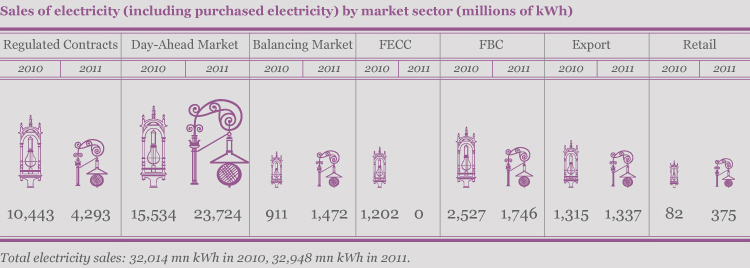
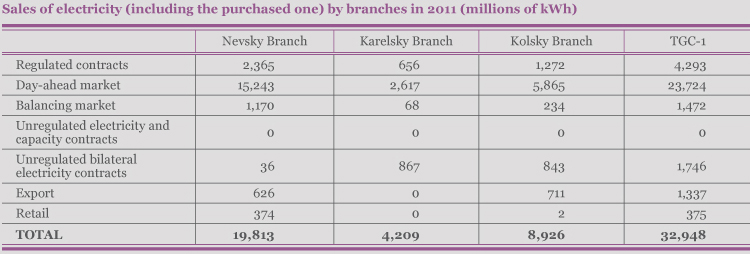
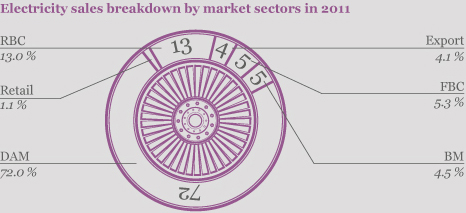
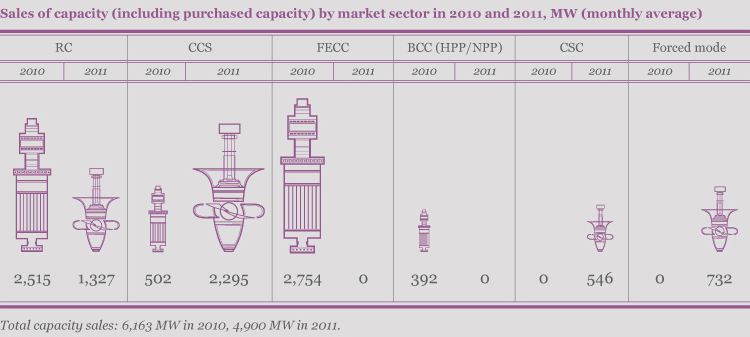

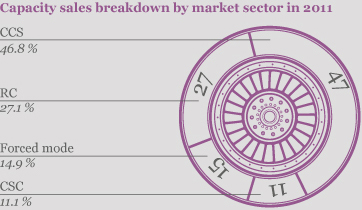
In 2011, payment for electricity and capacity supplied to the wholesale market of regulated contracts were carried out in accordance with the tariffs set by the Decree of the FTS of the Russian Federation dated 30 December 2010 No. 498-e/3 (with amendments approved by the Decree of the FTS of the Russian Federation dated 22 April 2011 No. 82-e/2). Payment for the electricity supplied to the day-ahead market and balancing market were made at prices formed on the basis of competitive bids of participants in the tenders. For the thermal power plants which provide heat supplies in the forced mode, payments for electricity from January till April inclusive were made at tariffs set by the FTS of Russia, and starting from May at prices formed on the basis of competitive bids of participants in tenders. Electricity was also purchased and payed for under free-trade bilateral contracts.
Payment for the capacity supplied to the market under regulated contracts and in forced mode were made at tariffs set by the FTS. Payment for the capacity supplied for competitive capacity screening and under long-term capacity supply contracts were made at prices approved by the non-profit partnership “ Market Council”.
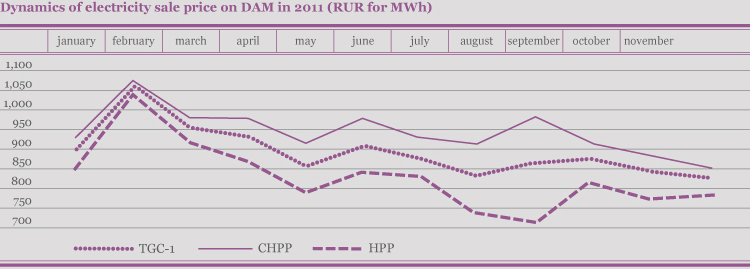
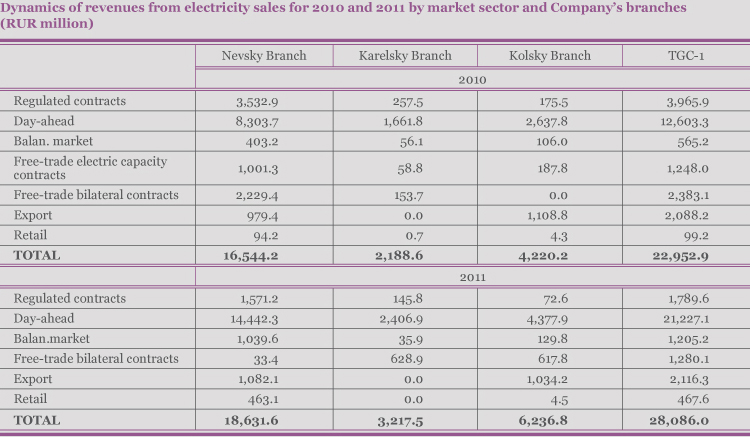
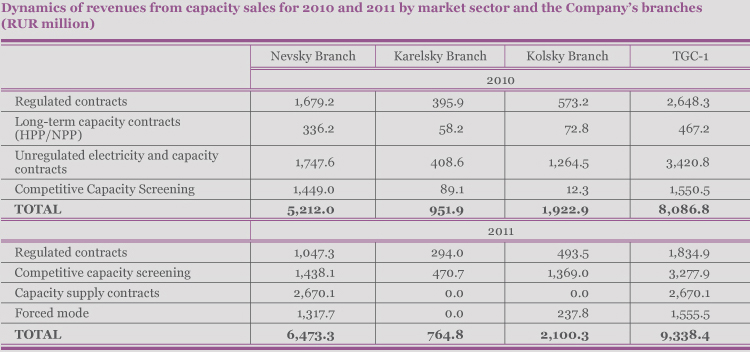
Electricity and Capacity Purchase
The primary reasons for electricity purchase in 2011 were as follows:
- Purchase of generation to provide for unregulated bilateral contracts;
- Purchase as a provision for export deliveries;
- Purchase to provide for regulated contracts’ obligations due to removal of equipment for repairing.
The primary reasons for capacity purchase in 2011 were as follows:
- Purchase for internal needs while exceeding the maximum consumption over the standard values;
- Purchase in order to meet the regulated contracts’ obligations;
- Purchase as a provision for export deliveries;
- Unscheduled start-ups/stops of equipment.
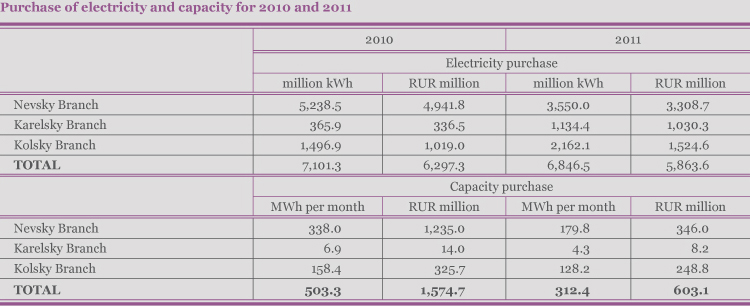
Electricity Exports
Due to a unique geographical location of some of TGC-1’s power plants, the Company can export part of the generated electricity. Currently, electricity is exported to Finland and Norway. Another possible destination for exports could become Estonia.
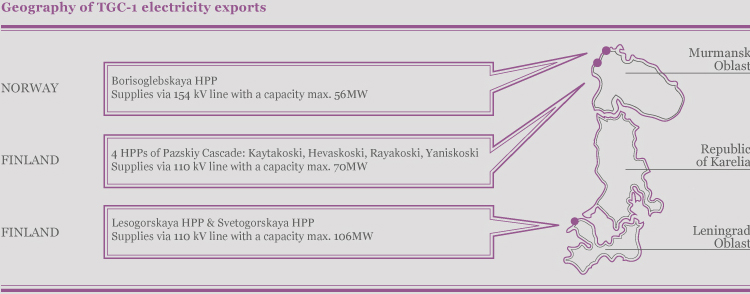
The total volume of export sales to all markets amounted to 1,337 million kWh in 2011.
The next one-year contract with Fortum Power and Heat Oy has been concluded for 2012. The three-year contracts with Scaent Europower Ltd. has been also extended until the end of 2012.


4.2. Heat Sales
Major parameters of heat sales
TGC-1 is a strategic supplier of heat to Saint Petersburg, Petrozavodsk, Murmansk, Kirovsk in the Leningrad Oblast and Apatity in the Murmansk Oblast. The Company sells heat at tariffs approved by local regulating bodies for categories of consumers.
Total useful heat output of TGC-1 power plants (without Murmansk CHPP) was 24.22 million GCal in 2011, compared to 25.66 million GCal in 2010. Proceeds from supplied heat increased by 5.4 % up to 19,998.6 million RUR.





